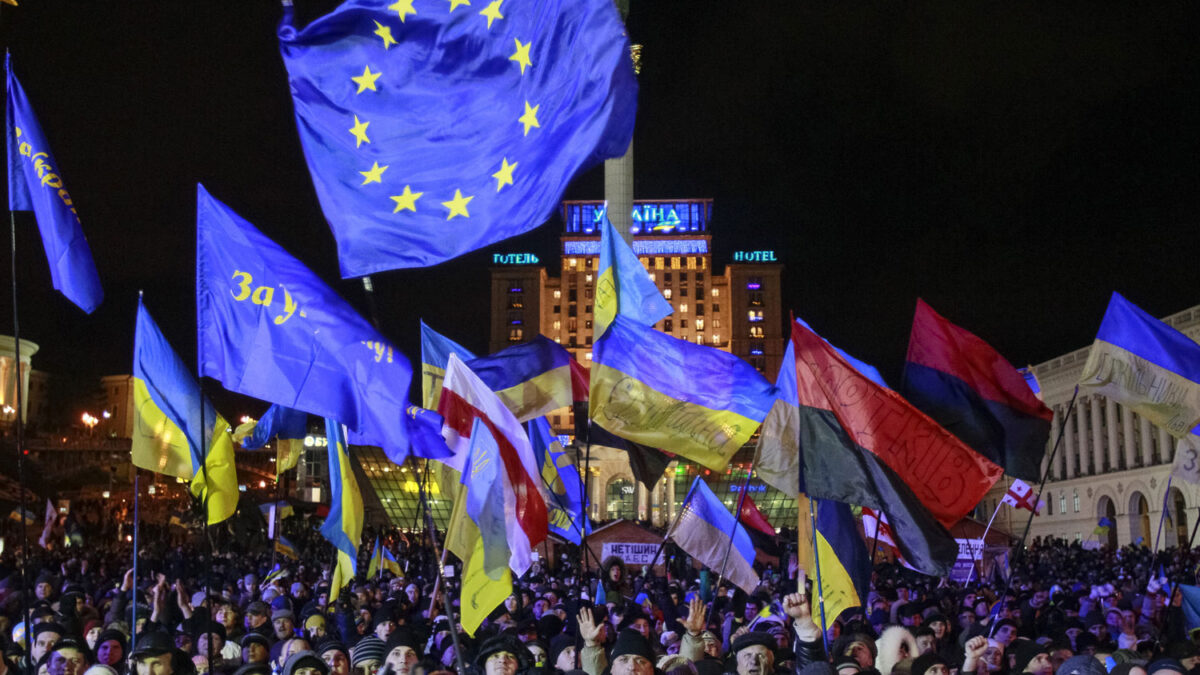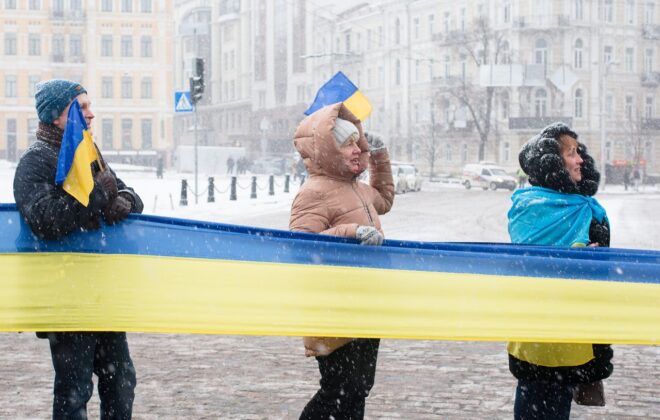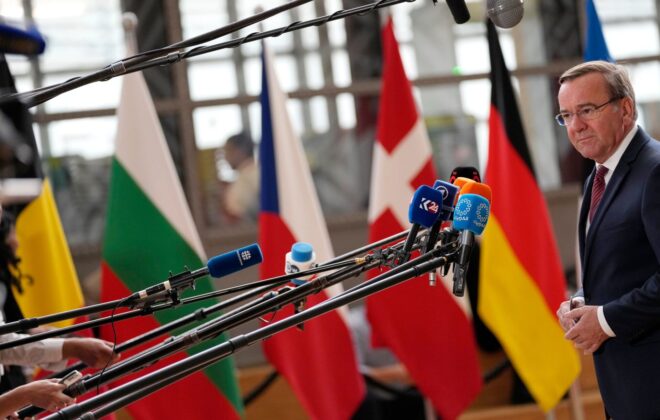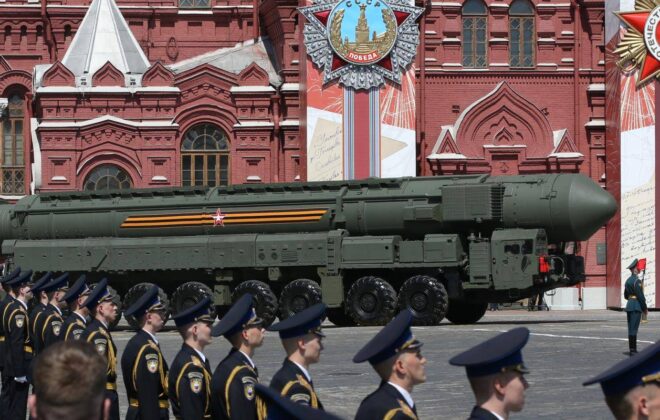Euromaidan, a rebirth of the Ukrainian nation, and the German debate on Ukraine’s national identity II. Putin as a midwife of the Ukrainian nation.
The “hybrid war” Russia is waging against Ukraine, and her aggressive propaganda against this country are direct consequences of the victory of the Maidan movement in Kyiv. By reversing the course of Ukraine’s geopolitical orientation, President Yanukovych had effectively put himself and his country in Moscow’s hands. In some sense, the Ukrainian President had demoted himself to the rank of a provincial Russian governor. Yet, as a result of Yanukovych’s flight, Ukraine eventually slipped from the Russian President’s hands. With it went Putin’s dream of a new empire. Without Ukraine, Putin’s geopolitical ambition of creating a Eurasian Union capable of providing a counterweight to the European Union cannot be fulfilled.
For most Ukrainians, the idea of war with Russia was unimaginable until 2014. In the eyes of many Ukrainians, Russia maintained its status as a cultural lodestar even after Ukraine became independent. Now Russia has become an enemy nation. On March 1, 2014, the Federation Council of the Russian Federation authorized President Putin to deploy Russian troops in Ukraine – according to the amended Article 10 of the Federal Law on Defence of 1996 (Zakon “Ob oborone”)1. This decision came as a shock to many Ukrainians: “The Russian part of me died…” – MacFarquhar quotes, in The New York Times, young economist Aleksey Ryabchyn who has become a member of the parliamentary bloc of Yulia Tymoshenko’s Batkivshchyna (Fatherland) party.2
Russia’s undeclared war has forced Ukrainians to take up arms and defend their country’s independence militarily – something which had not been necessary during the relatively peaceful transition in 1990-1991. Russia’s military aggression reinforces Ukraine’s nation-building process. It strengthens the formation of national Ukrainian identity – and also makes the process irreversible. Russia’s President Putin has thus become the midwife of the Ukrainian nation. Writes Andrew Wilson of University College London:
“Now Putin appears to be making a new Ukrainian nation before our eyes.”3
As a Ukrainian scholar put it,
“Mr. Putin has fulfilled the dream of Ukrainian nationalists” by forging a strong sense of Ukrainian national identity, infused with a heavy dose of anti-Russian sentiment.4
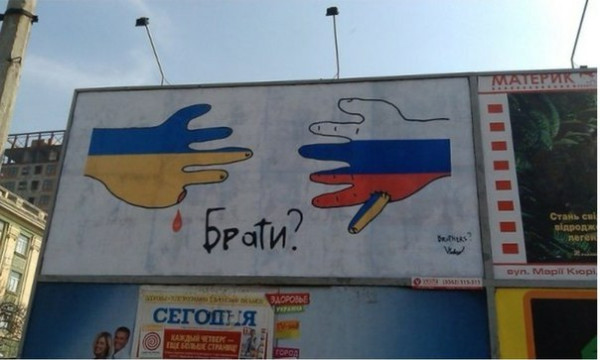
In an interview for the Russian state-controlled television channel NTV on October 19, 2014, Russian Foreign Minister Sergei Lavrov said: “We must not lose Ukraine […]. For us, Ukraine is a brother nation (Russ.: bratskii narod, brotherly people) sharing historical, cultural, and philosophical roots with us, not to mention language and literature.”5 However, these ties were cut by President Putin’s fratricidal war. Members of the same family, friends on either side of the border, do not speak to each other anymore. If they do, they generally end up arguing and hurling abuse. It looks increasingly like both nations may be enemies for generations to come.
Fußnoten
- On December 2009, the Federation Council empowered the President of the Russian Federation „to take decisions on the operational deployment of the Russian Federation Armed Forces beyond the territorial boundaries of the Russian Federation […] in order to fulfill the following tasks: […] 3) to protect Russian Federation citizens beyond the territorial boundaries of the Russian Federation from armed attack… (Russ.: sootechestvenniki za rubezhom, compatriots, fellow countrymen, fellow Russians).” The authorization of the deployment of Russian troops in Ukraine was repealed in order to uphold the official position of the Russian government, that Russia is not a party to the Ukraine conflict. See: European Commission for Democracy through Law (Venice Commission): Opinion on the Federal Law on the Amendments to the Federal Law on Defence of the Russian Federation, adopted by the Venice Commission at its 85th Plenary Session (Venice, 17-18 December 2010). German sympathisers with Russian pretensions (Putin-Versteher) compare the deployment of Russian troops in Ukraine, Georgia and Moldova, with “out-of-area” operations of NATO.
- Neil MacFarquhar, “Conflict Uncovers a Ukrainian Identity Crisis over Deep Russian Roots,” The New York Times, 18 October 2014 http://www.nytimes.com/2014/10/19/world/europe/conflict-uncovers-a-ukrainian-identity-crisis-over-deep-russian-roots-.html
- Andrew Wilson, “Five things the West can learn from the Ukraine Crisis,” Quartz, 8 October 2014 http://qz.com/277502/five-things-the-west-can-learn-from-the-ukraine-crisis. See also: Andrew Wilson, Ukraine Crisis: What It Means for the West. New Haven/London: Yale University Press, 2014.
- As quoted by Steven Pifer [US Ambassador to Ukraine in 1998-2000], Trip Report: Mid-September Impressions from Kyiv. Washington, DC: Brookings Institution, 2014 http://www.brookings.edu/blogs/up-front/posts/2014/09/15-trip-report-impression-kyiv-pifer
- “Lavrov: dlia Rossii Ukraina – ėto bratskii narod…,” TASS, 19 October 2014 http://itar-tass.com/politika/1517687.


